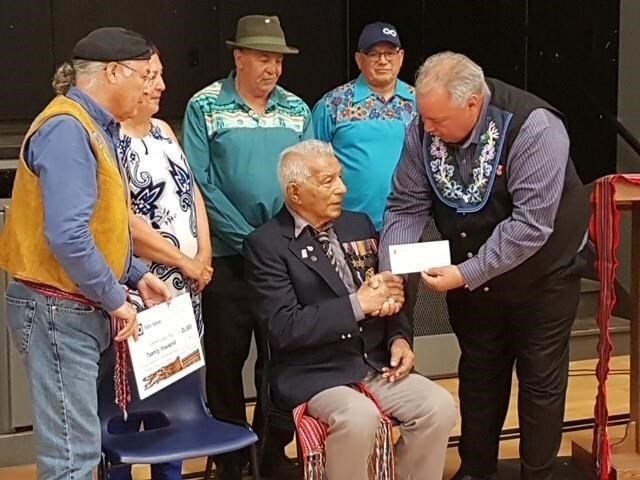A 101-year-old Métis veteran is being remembered for his powerful legacy, quiet strength and infinite kindness.
Louis Roy died Tuesday at a long-term care home in the northern Saskatchewan village of Île-à-la-Crosse. He was one of the oldest veterans of the Second World War.
“He was just this wealth of knowledge to me,” said Glenda Burnouf, his granddaughter, from Turtleford, Sask.
“I always thought, ‘My grandpa, there's nothing he couldn't do.’”
Roy was born on the north side of Île-à-la-Crosse Lake in 1920, and his family relied on trapping and fishing. When his father died 13 years later, the family relocated to Beauval, about 80 kilometres south.
Roy, who could speak Cree, English and French, enlisted in the army in 1942 when he was 21 and became a member of the Saskatoon Light Infantry. He trained in Saskatchewan, Alberta and Manitoba before taking a train to Halifax, where he boarded a ship to Europe to face the terrors and challenges of war.
For the next three years, Roy served in England, Africa and Italy. He spoke about his wartime experiences in a video made by the Métis National Council in 2019.
He talked about losing friends and companions. He said he was never injured but came very close many times.
He suffered hearing loss due to close-range gunfire and bombings and ended up in a hospital for a few weeks at the end of the war. While there, he volunteered to help staff and patients.
Like many Indigenous veterans, Roy said he didn't get much support from the Armed Forces when he returned to Canada following the war.
"They gave us some money to use on the road," he said in the video. Many Métis veterans have long said they didn’t get access to disability pensions, education, loans and other benefits available to others who served in the Second World War.
“Louis was one of many brave Métis Citizens enlisted to serve in Canada's armed forces against the evils of the world, all while facing discrimination at home,” Manitoba Métis Federation president David Chartrand said in a statement.
"He was willing to pay the ultimate sacrifice and serve his country alongside his brothers and sisters in arms.”
In 2019, decades after the war, Métis veterans were offered a recognition payment and an apology from Prime Minister Justin Trudeau. Roy was the first to receive it, the Manitoba Métis Federation said.
Burnouf said her grandfather didn’t often speak about his time in the war and instead focused on giving love to his family.
"He lived such a fulfilled life full of so many experiences, so much adventure,” she said. “He was just loved by so many people."
After Roy returned from the war, he trapped and fished while raising his family – including 10 children – near the area where he grew up. Later, he worked as a carpenter before retiring in 1985 at age 65.
He never really stopped either way of life and, when he was 85, built himself a home on the edge of a lake.
He was excited to pass all his life lessons on to his many grandchildren and great-grandchildren.
“He was that quiet grandpa,” Burnouf said. “He was always teaching us things, showing us things.”
Roy moved into the senior’s facility in 2020, after a century of adventure, achievement and independence, his family said.
Burnouf added that many people and organizations have reached out since his death. But the legacy for his family will always be the endless amount of love and advice that he shared.
"He just had that aura about him."
This report by The Canadian Press was first published Jan. 12, 2022.
Kelly Geraldine Malone, The Canadian Press



